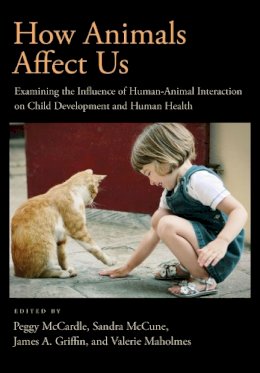
Stock image for illustration purposes only - book cover, edition or condition may vary.
How Animals Affect Us: Examining the Influence of Human-Animal Interaction on Child Development and Human Health
Peggy McCardle (Ed.)
FREE Delivery in Ireland
Description for How Animals Affect Us: Examining the Influence of Human-Animal Interaction on Child Development and Human Health
Hardback. Editor(s): McCardle, Peggy D.; McCune, Sandra; Griffin, James A.; Maholmes, Valerie. Num Pages: 240 pages, Illustrations. BIC Classification: JMB. Category: (P) Professional & Vocational. Dimension: 181 x 261 x 18. Weight in Grams: 610.
From infancy through old age, many people's lives are enriched by the love of a pet. In addition, both volunteer and trained service animals are an increasingly common sight as they participate in hospital, school, and nursing home visitation and therapeutic programs. Yet, there has been little scientific research on the role that pets and therapeutic animals play in our health and development. While animal-assisted therapies appear promising, they often lack solid evidence of effectiveness. More research is therefore needed to understand the effects of human–animal interaction (HAI) and to optimize the value of this interaction.
The findings ... Read morein this volume deepen our understanding of human and animal behavior, including the impact that pets can have on children's development and the efficacy of animal-assisted therapies. This volume first addresses HAI research methodology, including recommended research designs, terminology, and topics for further exploration. It then summarizes the progress of HAI research in child development and human health, including how young children think about animals, links between children's early abuse of animals and later conduct disorders, the association between pet ownership and better health, and whether such health improvements result in health cost savings. The volume ends with a detailed agenda for future research.
With its interdisciplinary approach, this book will appeal to a wide range of researchers and practitioners interested in what happens when people meet and engage with animals.
Show Less
Product Details
Publisher
American Psychological Association United States
Place of Publication
Washington DC, United States
Shipping Time
Usually ships in 7 to 11 working days
About Peggy McCardle (Ed.)
Peggy McCardle, PhD, MPH, is chief of the Child Development and Behavior Branch at the Eunice Kennedy Shriver National Institute of Child Health and Human Development (NICHD) of the National Institutes of Health. At NICHD, in addition to her oversight of the branch, Dr. McCardle directs the research program on language, bilingualism and biliteracy and developed the branch programs in ... Read moreadolescent and adult literacy. As branch chief, Dr. McCardle oversaw the development of a new program of research on the influence of interactions with animals on child health and development, for both pets in the home and in psychological and medical therapeutic settings, and she is commited to promoting evidence-based practice in the field of human–animal interaction. She is lead editor of the volumes The Voice of Evidence in Reading Research (2004); Childhood Bilingualism (2006), and Infant Pathways to Language: Methods, Models, and Research Directions (2008); lead author of Reading Research in Action: A Teacher's Guide for Student Success (2008); and has served as guest editor of thematic journal issues on reading, bilingualism, and English-language learner research. Sandra McCune, PhD, heads up the research program on human–animal interaction at the Waltham Centre for Pet Nutrition in the United Kingdom. Her background is in ethology, and she has studied a range of topics in cat and dog behavior for many years, including aspects of temperament, social behavior, feeding behavior, cognition, and age-related changes in behavior. The practical experience she gained while a veterinary nurse informed much of her doctoral study assessment of individual variation in the temperament of cats and its impact on their welfare when confined. She also has extensive experience studying what happens when cat and dog behavior interacts with human behavior in a variety of contexts. James A. Griffin, PhD, is the deputy chief of the Child Development and Behavior Branch at the Eunice Kennedy Shriver National Institute of Child Health and Human Development (NICHD) of the National Institutes of Health and the director of the early learning and school readiness program. Before his work at NICHD, Dr. Griffin served as a senior research analyst in the Institute of Education Sciences at the U.S. Department of Education; as the assistant director for the Social, Behavioral, and Education Sciences in the White House Office of Science and Technology Policy; and as a research analyst at the Administration on Children, Youth and Families. Valerie Maholmes, PhD, CAS, directs the research program in social and affective development/child maltreatment and violence in the Child Development and Behavior Branch at the Eunice Kennedy Shriver National Institute of Child Health and Human Development of the National Institutes of Health. Dr. Maholmes received a doctorate in educational psychology from Howard University in Washington, DC, and a 6-year degree with advanced study in school psychology, with a concentration in neuropsychological and psychosocial assessments from Fairfield University in Connecticut. Her research and clinical work have focused on the psychosocial, cultural, and environmental factors that influence children's learning and development, particularly low-income minority children. She held a faculty position at the Yale University Child Study Center in New Haven, CT, where she served in numerous capacities, including the director of research and policy for the school development program and the Irving B. Harris assistant professor of child psychiatry, an endowed professorial chair for social policy. Show Less
Reviews for How Animals Affect Us: Examining the Influence of Human-Animal Interaction on Child Development and Human Health

